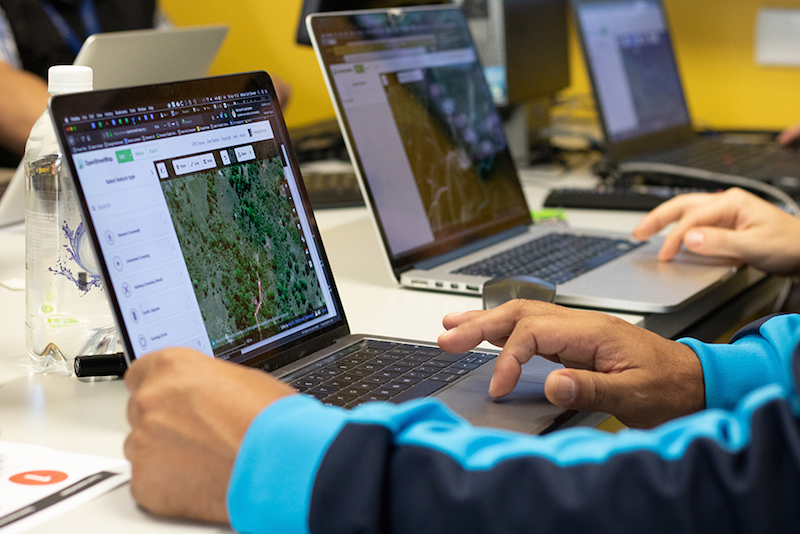eResearch Africa 2019: Data Science for Development

Digital technologies have changed the way research is conducted globally. These technologies have enabled researchers to collect vast volumes of data which then needs to be processed, analysed, managed, secured and stored for future reuse. The data scientists who wrangle that data contribute to real-world solutions for the world’s wicked problems. In April 2019 UCT eResearch hosted its bi-annual eResearch Africa conference to explore the practice, principles and opportunities of data science in knowledge production and decision-making.

As part of its commitment to #datascience4D eResearch Africa hosted a mapathon for areas struck by Cyclone Idai
This conference brought together IT practitioners, librarians, researchers and other interested individuals for two days of workshops and two days of presentations under the overarching theme Data Science for Development (DataScience4D). Richard van Huysteen, Executive Director of UCT’s Information and Communication Technology Services (ICTS) described the conference as a “meeting of the growing community of practice that supports the way research is done in the current and future eras.”
“We have seen this conference grow from a first meeting which really could have happened around a boardroom table to this year’s event with nearly 200 registrations,” he said in his introductory address. “This is an indication of the traction and importance that has been gained by the kind of practices and facilities put in place as institutions of higher learning to enable the work our researchers need to do, in whatever discipline and domain they happen to be in.”
The universe in a dome
The conference opening event took place at the Iziko Planetarium and Digital Dome where conference delegates were treated to a digital tour of the Milky Way as part of a presentation about research visualisation and eResearch collaboration by SARChI postdoctoral Research fellow in Astronomy, Dr Lucia Marcetti.
All is set! About to present at the @Iziko_Museums planetarium with @SpaceRangerSall the research in data visualisation and #data2dome we are carrying out at @AstronomyUCT ! Next will be my talk on Thursday at #eResAfrica19 @UCT_eResearch @UCT_news pic.twitter.com/wpcepp37NZ
— Lucia Marchetti (@Luci_aMarchetti) April 16, 2019
Data translated into beautiful images, thank you eReasearch for a great evening #eResAfrica19 pic.twitter.com/JlQ6WZqzi1
— emmakaye (@emmakaye) April 16, 2019
@UCT_eResearch #eResAfrica19 the milky way. pic.twitter.com/sFoZ5ncWKn
— Malindy O. Gumede (@Malindy_K) April 18, 2019
Europe’s federated infrastructure a model for Africa?
The keynote address was given by Tiziana Ferrari, Technical Director of the EGI Foundation, the co-ordinating body of EGI: the federated e-infrastructure set up to provide advanced computing services for data-driven research and innovation in Europe and around the world.
Ferrari explained how the digital infrastructure that is today EGI was originally built to tackle the grand challenges of high-energy physics with experiments in CERN. From here it has grown into a Pan-European digital infrastructure supporting all research disciplines worldwide.
Rather than pour a lot of money into a single huge data centre at CERN in Geneva, European countries decided rather to invest nationally in a federated system so they would have IT experts locally to support their own researchers, explained Ferrari.
She said this could be a model Africa could use to boost its own research on the continent.
“Skills building is a very important topic at this conference,” she noted. “It is very important for scientists to have IT experts available for them at universities and research centres as this kind of support is critical for data-intensive research.”
Tiziana Ferrari on research infrastructures-- a lot to gain by sharing vs operating in siloes; European focus but lessons to learn given existing relations with several SA HE institutions incl UCT and with CSIR #eResAfrica19 pic.twitter.com/q8ldUIlcBZ
— Nikki Crowster (@nikki_crowster) April 17, 2019
The next generation of data scientists
A key theme of the conference was the next generation of data scientists: education models from universities, summer schools, bootcamps and hands-on training programmes. This stream included presentations on topics as diverse as an online tool for genomics education: tackling the STEM shortage in our youth to astronomy as a platform for skills development.
#eResAfrica19 @carolune determined that young graduates are not left behind @UCT_eResearch pic.twitter.com/zqXu6inM5h
— Dale Peters (@dalepeters54) April 17, 2019
What an awesome initiative! Verena Ras enthusiastically conveying how they engage with communities and children through @mgen_africa mobile app. https://t.co/WcUfFyV2hz #eResAfrica19 pic.twitter.com/8UqlWRkUuy
— Kevin Govender (@govender) April 17, 2019
Other streams included eResearch case studies – which offered a range of presentations on a range of issues within the burgeoning world of South African eResearch – cybersecurity and big data analytics and the impact of technology on society.
Remembering that expert humans are essential to interpreting AI results @SaintlyVi inspiring season on day 4 of #eResAfrica19 @UCT_eResearch pic.twitter.com/d1uZIq8aNl
— Renate Meyer (@WrenAren) April 18, 2019
Focus on development
True to the theme DataScience4D the conference left its own positive impact. Instead of giving gifts to the speakers, the conference organisers donated instead to the Cape Digital Foundation, a local non-profit organisation working to create ‘smart townships’ in South Africa. The organisation is working to build digitally-savvy business communities by providing digital training to township business owners and helping local entrepreneurs contribute to building township economies.
In addition, the UCT eResearch, working with Digital Library Service, hosted a Mapathon for the duration of the conference. Through the Missing Maps Project and Humanitarian Open Street Map Team, the conference delegates worked to use satellite imagery to support the disaster response operations of humanitarian relief agencies working in the cyclone-hit areas of Mozambique in the wake of Cyclone Idai.
Making progress on the @UCT_eResearch #mapathon #eResAfrica19 #mappingidai pic.twitter.com/2X3uxsVd3W
— UCT Digital Library (@DigitalUct) April 18, 2019
